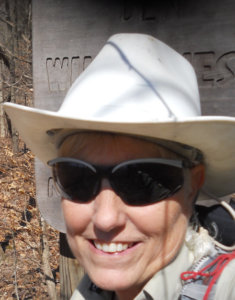 Kelly Pearson is the District Wilderness Technician and Volunteer Coordinator at Shawnee National Forest. Kelly is a 21CSC Champion of the Year for 2018. This Award recognizes individuals from agencies and organizations that partner with 21CSC programs to help engage the next generation of conservation and community leaders in service, education and training.
Kelly Pearson is the District Wilderness Technician and Volunteer Coordinator at Shawnee National Forest. Kelly is a 21CSC Champion of the Year for 2018. This Award recognizes individuals from agencies and organizations that partner with 21CSC programs to help engage the next generation of conservation and community leaders in service, education and training.
The 2018 Champions of the Year will be recognized at the annual Partnership for the 21CSC Meeting, happening February 12, 2018 in Washington, DC. This event is part of The Corps Network National Conference.
- Learn more about Kelly – Click here.
- Learn more about the 21CSC Champion of the Year Award – Click here.
-
Tell us about your current role.
I am the District Wilderness Technician and Youth, Hosted and Volunteer Coordinator for the Hidden Springs/Mississippi Bluffs Ranger District of the Shawnee National Forest. I manage seven Congressionally-designated wilderness areas to ensure the Forest is following the mandate of the 1964 Wilderness Act and the 1990 Illinois Wilderness Act to protect the character of each space.
As the Youth, Hosted and Volunteer Coordinator, I am responsible for recruiting volunteers for service projects, developing short and long-term service projects, and developing and nurturing partnerships. In 2017, 604 volunteers contributed 12,457 hours of service towards wilderness stewardship, conservation education, wildlife habitat management, customer service and archeology.
-
Tell us a little bit about your background. How did you get started in conservation/land and water management?
As a student in high school, my first “real” job was an enrollee in the Youth Conservation Corps for the Shawnee National Forest, stationed in the exact ranger station where I currently work. My experiences that summer solidified my passion for natural resource management and land stewardship. Most importantly, it taught me the values of teamwork, self-confidence, and a good work ethic. I continued for the next few summers in the Youth Conservation Corps as a Crew Leader, eventually transitioning to the Young Adult Conservation Corps. These positions were important in forming my leadership skills and helping to connect others to the natural world. After a 10 year period away from the Forest Service, I was recruited for a seasonal position. Now, 26 years later, I feel very fortunate to have a job that I am so passionate about.
-
Tell us about how you have engaged with Service and Conservation Corps.
The volunteer program on the Shawnee NF, also known as the Shawnee Volunteer Corps, is built on the foundation of teamwork, leadership, stewardship, partnership and education. This foundation is a solid match for the different Corps that we have hosted. The Shawnee Volunteer Corps provides experiential service where, no matter if you are providing four hours or four months of service, you are guaranteed to learn something about yourself, the local natural and cultural history, and feel great at the end of the day. Since 2005, we have hosted St. Louis AmeriCorps Emergency Response Teams; AmeriCorps NCCC teams, who are immersed in the wilderness for a week; AmeriCorps VISTA participants; and VetsWork participants from Mt. Adams Institute.
-
What advice would you offer to other employees from land/water management agencies and nonprofits that are interested in partnering with 21CSC programs (What to expect, etc.)?
Through my experiences working with different Corps, I have found that it is always important to make sure you are ready before you begin hosting teams. Do you have the projects, the leadership, the tools, etc. With that said, you must also remain flexible. The Corpsmembers arrive with all levels of skills and abilities and backgrounds. Keeping your expectations real is important, but what is most important is that everyone on the team feels valued and can connect with the project. I like to focus on the outcomes more than the outputs.
-
What are the most beneficial aspects of partnering with a 21CSC Program?
For the Shawnee NF, partnering with 21CSC organizations is integral to increasing capacity. Many hands make light work, as they say. In addition, it is our chance as an agency to connect with potential future leaders in the conservation community.
-
What advice would you offer to young people in 21CSC programs who are interested in careers in conservation and land/water management?
I highly recommend a four-year degree as a great starting point. In addition, volunteering is very important to potential employers. Being willing to spend your own personal time doing conservation service, or any service, says a lot about a person.
